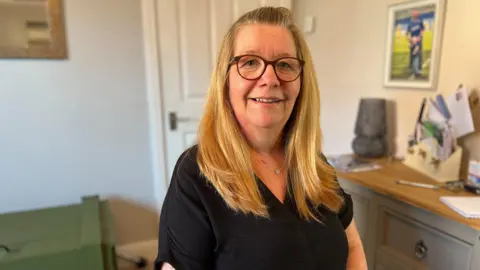Can anyone tackle Derbyshire's SEND crisis?
 BBC
BBCWith the local elections fast approaching, there is one issue thousands of families will be thinking about in Derbyshire.
That is how Derbyshire County Council has approached special educational needs services.
It comes as opposition parties have pointed to the problems with special educational needs and disabilities (SEND) services in Derbyshire, as what they say is one example of the current Conservative administration's failings.
Whilst SEND in Derbyshire is overseen by a partnership between the county council and the local NHS, it is the council who has the bulk of legal responsibilities and is on the front line of communicating with families.
The family of 16-year-old Josh Higginbottom, from Chesterfield in Derbyshire, are among those currently trying to engage with the council.
Josh has cerebral palsy, epilepsy, and has just had spinal fusion surgery, the latest in a long list of surgeries.
He has received council-funded transport to Ashgate Croft School for the past six years.
However, it was taken away last autumn when Josh turned 16 - the age home to school council transport for SEND children becomes discretionary.
Josh's mum Sharon Davis says she received no communication from the council informing them of the need to reapply.
The council says Josh lives within the legal walking distance of three miles (4.8km) from the school.

But Sharon found the suggestion Josh walk to school "discriminative" and "tin-eared" given his needs.
"Josh has never walked, he's never, ever likely to walk, he's always used a mobility aid. And they can't count someone using a mobility aid as someone walking," she said.
"We are aware it is only half a mile from school, but we have to cross numerous roads, a four-crossing road, there's a wide junction, the pavements on one side [aren't wide enough] and the roads are full of potholes. We did get stuck in one a few weeks ago."
The walk would be close to half an hour in total given Josh's needs, and whilst the family have access to a vehicle, Sharon says there are safety issues making sure Josh can exit the vehicle safely once at the school without help because of congestion at peak times.
"We get used to having to fight our corner," says Sharon. "They're very careless... nothing's been straightforward.
"I've offered to walk the route with them, then they'd see how difficult it is, and how difficult it is to get him through the school gates."

In response, a spokesperson for Derbyshire County Council said: "We do understand that the wording we use when communicating with parents who have children who use wheelchairs can seem insensitive. Unfortunately the phrase 'walk to school' is one that is in national legislation.
"The school have a long-established method of making sure pupils get out of the vehicle they arrive in and into the building safely."
An Ofsted report last autumn accused the council of "widespread and system failings", with children missing large amounts of their education because of the long waits for needs assessments.
Families also told the public body that they were left "in crisis" because of their requests for help being ignored by the council.
The County Council Network recently warned many councils like Derbyshire risk insolvency within the next year thanks to an accounting change that could land a collective £5bn SEND deficit on to council books.
What are the problems?
Derbyshire's overall SEND budget stands at roughly £128m.
The county council has overspent it by about £47m, and is forecast to further outspend it by another £30m in the next financial year.
A key pressure is rising demand for Education Health and Care Plans (EHCPs), the legal document families need to obtain to get their child the right support for their needs.
Demand is up 20% on the previous year and the projected overspend in this area is about £3m.
A lack of special needs placements in both special and mainstream schools is also a key issue. Additionally, placements outside mainstream schools to meet a child's needs are often expensive, at an average £58,000 per pupil, according to the County Councils Network.
Families in Derbyshire are also waiting a long time to get assessments for an autism diagnosis in particular, a condition that forms a large number of needs assessment demands.
The NHS in Derbyshire has among the worst waiting lists for this in England, according to the latest figures.
An improvement plan has been agreed with Ofsted and the authority says it is "investing in employing more specialist staff, improving efficiency around assessments and creating more special needs school places".
How would the party leaders tackle it?
Derbyshire's party leaders all offer different thoughts on how they would tackle it.
The current leader of the council and Derbyshire Conservative leader Barry Lewis says there is a £13m investment programme boosting placements in both mainstream and specialist schools, adding the party would keep investing in support services for parents.
He also recognised the difficulties in transport and post-16 provision for children like Josh.
"Unfortunately it is the case that resources are very limited and we are being stretched by the fact we're facing rising demand in this area," he said.
Derbyshire Labour's Joan Dixon says the party would improve the communication process with families, ensuring they "actually speak to a real person" rather than endless emails.
But she also acknowledges that improving the finances when it comes to SEND is far from simple.
"I think it's going to be very difficult... and that's why we're not making promises to people, because we need to look at the books first before we start changing things," she said.
The Derbyshire Liberal Democrats say it would hold open panels in which councillors can ask questions, and give parents the ability to requisition officers to give evidence and increase transparency.
Derbyshire Reform say it wants to improve the "archaic" system for getting an EHCP and shorten the process, whilst the Derbyshire Greens say it would reverse any recent cuts to SEND services.
But Kelly Jarvis, from the independent SEND advice service Sunshine Support, says "there aren't enough staff to just cover the basics, let alone some of these things [the parties] have proposed".
She added: "The most meaningful improvement is simply an email address that works, a person who answers it within a sensible timeframe of say three days, and people on the end of the telephone."
National organisations that represent councils say the solution is more fundamental.
The Local Government Association is calling on the government to "urgently address the issue" in the upcoming Spending Review as part of a wider programme for reform.
As far as Josh is concerned, Sharon says she will keep hoping the council listen to her appeals to rethink their decision.
She added: "All he keeps saying is, 'when is my transport coming back?'"
Follow BBC Derby on Facebook, on X, or on Instagram. Send your story ideas to [email protected] or via WhatsApp on 0808 100 2210.
